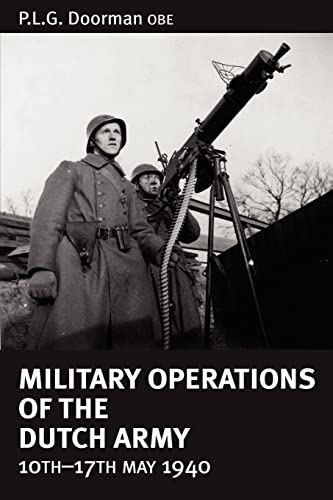
Military Operations of the Dutch Army 10th-17th May 1940
by P. L. G. Doorman
Popularity
4.61 / 5
* A book's popularity is determined by how it compares to all other books on this website.
Where to buy?
Buy from Amazon* If you buy this book through the link above, we may receive a small commission at no extra cost to you.
Military Operations of the Dutch Army 10th-17th May 1940 by P. L. G. Doorman
Details
War:
World War II
Perspective:
Commanders
True Story:
Yes
Biography:
No
Region:
Europe
Published Date:
2010
ISBN13:
9781906033828
Description
Brief Summary
Military Operations of the Dutch Army 10th-17th May 1940 by P. L. G. Doorman provides an in-depth exploration of the Dutch army's role in the 1940 Western Campaign. This book fills a gap in historical literature, often dominated by narratives on the German forces or the Dunkirk evacuation, by focusing on the Netherlands' military strategy and resistance. Doorman meticulously outlines the military environment of the time, offering insights into the pre-campaign plans and the geographical considerations that influenced military decisions. The text offers a chronological account of the Dutch army's maneuvers and engagements with the German forces, shedding light on their strategic capabilities and fortitude.
Main Themes and Topics
The central themes of this book include the strategic planning and operational challenges faced by the Dutch army during the 1940 invasion. Doorman delves into the critical aspects of military geography, which significantly influenced the Dutch defensive strategies. A considerable portion of the book is dedicated to detailing the daily military operations, emphasizing the tactical decisions made at various levels of command. Another important theme is the courage and resilience of the Dutch troops in the face of overwhelming odds, showcasing their determination and tactical acumen during the week-long conflict.
Writing Style and Tone
P. L. G. Doorman adopts a meticulous and analytical writing style that is well-suited to the detailed subject matter of military operations. The tone is scholarly and objective, with a focus on presenting an accurate and comprehensive account of the events. Doorman's narrative is enriched by his attention to detail, particularly in the descriptions of battle maneuvers and military strategies. This approach ensures that the book serves as both an informative resource for historians and an engaging read for military enthusiasts.
Criticism
Some readers may find the level of detail in Military Operations of the Dutch Army 10th-17th May 1940 to be overwhelming, particularly those who are not deeply acquainted with military terminology or the intricacies of historical military strategy. The book's heavy focus on operational details may overshadow the broader context of World War II events for general readers. Despite these potential drawbacks, the detailed account remains a valuable asset for those seeking an in-depth understanding of this specific theatre of the war.









